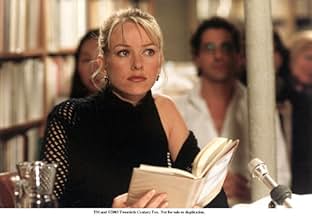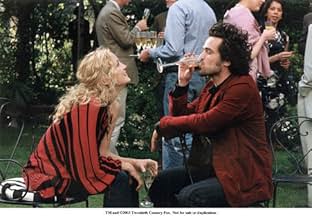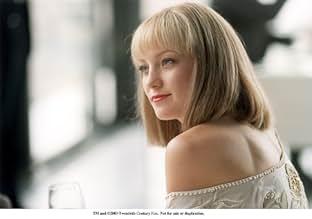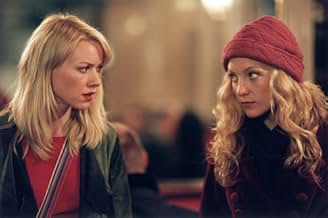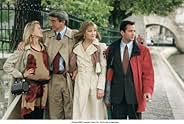IMDb-BEWERTUNG
4,9/10
12.397
IHRE BEWERTUNG
Französische vs. amerikanische soziale Bräuche und Verhaltensweisen werden in einer Geschichte über einen Amerikaner beobachtet, der ihre französische Schwester in Paris besucht.Französische vs. amerikanische soziale Bräuche und Verhaltensweisen werden in einer Geschichte über einen Amerikaner beobachtet, der ihre französische Schwester in Paris besucht.Französische vs. amerikanische soziale Bräuche und Verhaltensweisen werden in einer Geschichte über einen Amerikaner beobachtet, der ihre französische Schwester in Paris besucht.
- Regie
- Drehbuch
- Hauptbesetzung
- Auszeichnungen
- 2 wins total
Empfohlene Bewertungen
After viewing the unfortunate "Golden Bowl" (also by James Ivory) the day before, an exposure to "Le Divorce" was certainly a refreshing sip of champagne. This may be the first James Ivory movie I've seen where I forgot to look at the sets (unlike Ivory's other French venture, "Jefferson in Paris"). This is mostly due to the depth of certain actors and the fact that this time Ivory decides to close in on them rather than frame them. When the book came out, as an American living in Paris for 30 years, I avoided reading another set of American observations on everything French that foreign residents here hate, and I can't say that the movie avoids the pitfalls of throwing around generalities. Yet this is kept to an astonishing minimum, perhaps because few of the main characters really consider themselves typical representatives of their native country. Instead of a plethora of reflections coming out of their mouths, "the French are like this, the Americans are like that," the viewer can actually draw his own conclusions about which country has the "nicest" people and the place of formality when it comes to private matters. After all, would the story have been that much different if it had dealt with class differences in New York City? The characters who do tend to generalize are perhaps the least involved in what is going on. They form the real "décor" of the film, rather than the wallpaper and polished furniture, although these elements certainly haven't been omitted.
I find it strange that the two most interesting actors are supposed to belong to the subplot, Kate Hudson and Thierry L'Hermitte. The latter is currently being wasted in his late middle age in French films, and, like Louis Jourdan in "Gigi," manages to bring a little subtle something extra to the most stereotyped part in the film. I'd like to see him extend what he has done here, if any producer or director can be bothered.
The film had such a short run in France that I missed seeing it in a movie theater, and it was dismissed by most French critics on its release like the way that some of the American characters are dismissed by their French counterparts in the film itself. It would be a shame to overlook this light but not lightweight effort, for it has a surprisingly natural charm and raises interesting questions about how much the culture that forms our conditioning influences our very humanity.
I find it strange that the two most interesting actors are supposed to belong to the subplot, Kate Hudson and Thierry L'Hermitte. The latter is currently being wasted in his late middle age in French films, and, like Louis Jourdan in "Gigi," manages to bring a little subtle something extra to the most stereotyped part in the film. I'd like to see him extend what he has done here, if any producer or director can be bothered.
The film had such a short run in France that I missed seeing it in a movie theater, and it was dismissed by most French critics on its release like the way that some of the American characters are dismissed by their French counterparts in the film itself. It would be a shame to overlook this light but not lightweight effort, for it has a surprisingly natural charm and raises interesting questions about how much the culture that forms our conditioning influences our very humanity.
I think this could have been an interesting film. Instead, it shows the French as being close-minded, rude and arrogant with no concern about other people's feelings. The American sisters are annoying in their lack of backbone. Instead of standing up for themselves or each other, they simply lie down and let husbands, boyfriends and in-laws humiliate them. Their last name should be doormat. The scenery is both beautiful and breathtaking. The restaurant scenes gives us some insight on the French artfulness of food. Dining is not just a daily routine but an adventure of taste, color and texture. Even when insulting, the French language is a pleasure to hear. Sadly, the bad heavily outweighs the good in this movie.
It's amusing to read some of the comments in this page of IMDb. Most postings place the blame for what they perceive as the failure of this picture on James Ivory, Ismael Merchant and Ruth Prawer Jhabvala, the successful creative team of some of the best movies of recent years. In fact, the sin they appear to have committed was to adapt the Diane Johnson's novel about the contrasts she has always written about between two cultures that should be more similar: the French and American, yet, as we read in the book, and now watched in the film, they are not as close as one would imagine.
First, the French one sees portrayed in the film belong to the high classes that are imbued in their traditions, savoir faire, their sense of style and being B.C.B.G., something the Americans, being somehow a new society without those traditions cannot comprehend. Money is a taboo subject to be spoken at all by the wealthy French, whereas in America the flaunting of having made fortunes and having millions is an everyday subject for the higher ups.
Ms. Johnson, who has lived in France for quite some time, is an observant of that society. In her many books about life in that country, the study in the contrasts she sees, are at center stage and the mixing of Americans with the French bourgeoisie produces surprising results that make the reading of her novels more compelling for the joy they bring to her readers.
Isabel, the young American, arriving to stay with her sister Roxanne, takes easily to the new surroundings. In doing so, she completely disregards the established rules when she enters in a liaison with Marc-Henri, who sees the occasion as one for amusing himself for a while. Roxanne, on the other hand, soon discovers what she is against when her French husband decides to ask her for a divorce. Little has prepared her for the consequences that go with it and the archaic laws about a couple's separation in that country, which benefits the husband while punishing the wife.
The other theme at the core of the story is a painting Roxanne has brought with her from San Diego. The possibility of it being a real Delacroix is now at the center of the divorce settlement. Where one can see it has nothing to do with the cheating husband, Suzanne, the mother-in-law deems otherwise because of the possible value the painting will fetch when it's sold.
Naomi Watts makes another great contribution in her appearance as Roxanne. Kate Hudson is not in the same league, although her good looks and natural charm makes one care more for her Isabel. The delicious Leslie Caron plays Madame de Persand with great panache. Just watching her remarking about the granulated sugar Charlotte offers her to sweeten her tea is one of the delights of the film. Tierry Lhermitte is seen as the callous Edgar. Glenn Close plays Olivia Pace, a writer,who might be Diane Johnson's alter ego in the story. Stephen Fry, Stockard Channing, Sam Waterston, and the rest of the French and American cast do a good job.
This film has a feeling of being more French than some French movies. The cinematography of Pierre Lhomme is wonderful as he takes his camera all over the city showing us what a treat it is to be in Paris, even for a visit. The other thing that comes across is the involvement of the late Ismail Marchant to the production. Mr. Merchant got great locales in where to film and had a great eye for the style of the pictures he was producing. His absence, alas, is sadly missed from the latest James Ivory project "The White Countess".
In spite of not being up to some of his best movies, James Ivory still shows he has a keen eye for presenting the material on the screen.
First, the French one sees portrayed in the film belong to the high classes that are imbued in their traditions, savoir faire, their sense of style and being B.C.B.G., something the Americans, being somehow a new society without those traditions cannot comprehend. Money is a taboo subject to be spoken at all by the wealthy French, whereas in America the flaunting of having made fortunes and having millions is an everyday subject for the higher ups.
Ms. Johnson, who has lived in France for quite some time, is an observant of that society. In her many books about life in that country, the study in the contrasts she sees, are at center stage and the mixing of Americans with the French bourgeoisie produces surprising results that make the reading of her novels more compelling for the joy they bring to her readers.
Isabel, the young American, arriving to stay with her sister Roxanne, takes easily to the new surroundings. In doing so, she completely disregards the established rules when she enters in a liaison with Marc-Henri, who sees the occasion as one for amusing himself for a while. Roxanne, on the other hand, soon discovers what she is against when her French husband decides to ask her for a divorce. Little has prepared her for the consequences that go with it and the archaic laws about a couple's separation in that country, which benefits the husband while punishing the wife.
The other theme at the core of the story is a painting Roxanne has brought with her from San Diego. The possibility of it being a real Delacroix is now at the center of the divorce settlement. Where one can see it has nothing to do with the cheating husband, Suzanne, the mother-in-law deems otherwise because of the possible value the painting will fetch when it's sold.
Naomi Watts makes another great contribution in her appearance as Roxanne. Kate Hudson is not in the same league, although her good looks and natural charm makes one care more for her Isabel. The delicious Leslie Caron plays Madame de Persand with great panache. Just watching her remarking about the granulated sugar Charlotte offers her to sweeten her tea is one of the delights of the film. Tierry Lhermitte is seen as the callous Edgar. Glenn Close plays Olivia Pace, a writer,who might be Diane Johnson's alter ego in the story. Stephen Fry, Stockard Channing, Sam Waterston, and the rest of the French and American cast do a good job.
This film has a feeling of being more French than some French movies. The cinematography of Pierre Lhomme is wonderful as he takes his camera all over the city showing us what a treat it is to be in Paris, even for a visit. The other thing that comes across is the involvement of the late Ismail Marchant to the production. Mr. Merchant got great locales in where to film and had a great eye for the style of the pictures he was producing. His absence, alas, is sadly missed from the latest James Ivory project "The White Countess".
In spite of not being up to some of his best movies, James Ivory still shows he has a keen eye for presenting the material on the screen.
I keep trying to figure out why this movie is rated so low. I thought it was very good, and that was before I started reading the book -- well more than halfway through, I think it's a faithful adaptation that delivers the storyline and the theme of the novel very well. I tend now to read the novel a movie is based on after I've seen the film, since my experience has taught me that doing the reverse always leads to disappointment in the movie. This was not an error with this title. I think all the casting, all the acting, and especially the direction, were well done.
It seems to me that somehow viewers were expecting too much from the movie. My philosophy is that expectations are arranged disappointments, and I try not to expect anything going in. I do admit that I had some doubts when it seemed that Merchant-Ivory were doing what looked like a light comedy, but there is much more to the book and film than that, first of all, and secondly, why should accomplished filmmakers not move around the genres? Look at Kubrick and The Archers, just to name two, who did so and did it successfully. I wonder how many people went in expecting "Howards End" and thus were disappointed, not in the film but by their own expectations. It's not fair to the filmmakers. Expecting "Le Divorce" to be on par with "Howards End" was like expecting "Howards End" to have the same effect as "Shakespeare Wallah" -- two completely different experiences. It's entirely possible, in fact, that Merchant-Ivory might not have done as good a job on "Le Divorce" had they not made "Howards End" first. It's a matter of process. My point being, that each film must be judged on its own merits.
I've read a couple of comments and message board posts that complain about how the movie makes French people look -- arrogant, garrulous, etc. I think that's overstating a generalization. The movie makes THESE PARTICULAR French people look arrogant and garrulous, because they are -- and devious and self-centered and boorish. But to leap to the conclusion that the movie is making a statement about all French people is patently ridiculous. "The views expressed by the characters in this movie are entirely their own".
On the other hand, one has to remember that Diane Johnson, who wrote the book and a number of books about the culture since, spends half her time in France. She does't take her subjects lightly; she's an intelligent, thoughtful, and though-provoking writer, and I would urge the people who find the movie too subjective to go to its source and read the book. They will find that the book is written from the point of view of one person, and is about the relations between two families -- not two complete cultures. Just because people say something about a culture does't make it true. Perception itself is subjective. In the book (I can't recall if this occurs in the film, I'll have to see it again) Uncle Edgar, perhaps the most sensible character, himself speaks those words that send a shiver of annoyance up my spine: "You Americans. You think..." As if we all think the same thing (and we all know THAT isn't true!). It shows that subjectivity is a common human trait, that we look at the world with our own particular set of blinders, filter our thought through our cultural stance, although I think that perhaps French thought is more synthesized and common than American thought which is, by nature of the population, more diverse.
In the end I think that the book and the film are VERY objective, and let us look at our own judgmental selves and see how the judgmental and subjective nature of our thought and attitude can be damaging and inhibiting. I think that's the theme, and it comes across very well.
It seems to me that somehow viewers were expecting too much from the movie. My philosophy is that expectations are arranged disappointments, and I try not to expect anything going in. I do admit that I had some doubts when it seemed that Merchant-Ivory were doing what looked like a light comedy, but there is much more to the book and film than that, first of all, and secondly, why should accomplished filmmakers not move around the genres? Look at Kubrick and The Archers, just to name two, who did so and did it successfully. I wonder how many people went in expecting "Howards End" and thus were disappointed, not in the film but by their own expectations. It's not fair to the filmmakers. Expecting "Le Divorce" to be on par with "Howards End" was like expecting "Howards End" to have the same effect as "Shakespeare Wallah" -- two completely different experiences. It's entirely possible, in fact, that Merchant-Ivory might not have done as good a job on "Le Divorce" had they not made "Howards End" first. It's a matter of process. My point being, that each film must be judged on its own merits.
I've read a couple of comments and message board posts that complain about how the movie makes French people look -- arrogant, garrulous, etc. I think that's overstating a generalization. The movie makes THESE PARTICULAR French people look arrogant and garrulous, because they are -- and devious and self-centered and boorish. But to leap to the conclusion that the movie is making a statement about all French people is patently ridiculous. "The views expressed by the characters in this movie are entirely their own".
On the other hand, one has to remember that Diane Johnson, who wrote the book and a number of books about the culture since, spends half her time in France. She does't take her subjects lightly; she's an intelligent, thoughtful, and though-provoking writer, and I would urge the people who find the movie too subjective to go to its source and read the book. They will find that the book is written from the point of view of one person, and is about the relations between two families -- not two complete cultures. Just because people say something about a culture does't make it true. Perception itself is subjective. In the book (I can't recall if this occurs in the film, I'll have to see it again) Uncle Edgar, perhaps the most sensible character, himself speaks those words that send a shiver of annoyance up my spine: "You Americans. You think..." As if we all think the same thing (and we all know THAT isn't true!). It shows that subjectivity is a common human trait, that we look at the world with our own particular set of blinders, filter our thought through our cultural stance, although I think that perhaps French thought is more synthesized and common than American thought which is, by nature of the population, more diverse.
In the end I think that the book and the film are VERY objective, and let us look at our own judgmental selves and see how the judgmental and subjective nature of our thought and attitude can be damaging and inhibiting. I think that's the theme, and it comes across very well.
...because I LOVED this movie. I read the other reviews and I'm astounded. I think this is a great movie. I received the DVD for free, and was so pleasantly surprised by the acting, the scenery, the humor, the exaggerated French snobbishness. I thought Kate Hudson glowed, carrying most of the movie. I loved the lingerie store scene, where the French women giggled over Isabel being "le petite" when she showed them her chest. I loved how Naomi Watt's character was perpetually scowling until she met the handsome divorce lawyer, and visibly fell in love at first sight. Glenn Close was wonderful as the graceful, well-aged American writer, clearly bitter about her being dumped by Edgar, but over-compensating with sarcasm. I loved the scene in the police car, where they were going to investigate a murder, and got side-tracked by the police women's perfume. There are so many wonderful nuances that make this movie great, I don't even care that the plot was muddled and non-existent. It's visually wonderful to watch, and the acting is superb. It's the kind of movie girls like to watch on a weekend, doing their nails, just relaxing. It moves slow, but it's additive and I've watched it more than I'll admit...
Wusstest du schon
- WissenswertesThe painting sold before Roxy's LaTour is Claude-Joseph Vernet's "La Nuit, au Port au Clair de Lune", which is in the Louvre's permanent collection.
- PatzerWhen Isabel and Edgar have their last outing together, Isabel is clearly wearing red nail lacquer in the restaurant. When they say goodbye outside, her nails are no longer red.
- SoundtracksQu'est-ce qu'on Attend pour Être Heureux ?
Music by Paul Misraki
Lyrics by André Hornez
Performed by Patrick Bruel and Johnny Hallyday
Top-Auswahl
Melde dich zum Bewerten an und greife auf die Watchlist für personalisierte Empfehlungen zu.
- How long is The Divorce?Powered by Alexa
Details
- Erscheinungsdatum
- Herkunftsland
- Offizielle Standorte
- Sprachen
- Auch bekannt als
- Le divorce
- Drehorte
- Produktionsfirmen
- Weitere beteiligte Unternehmen bei IMDbPro anzeigen
Box Office
- Bruttoertrag in den USA und Kanada
- 9.081.057 $
- Eröffnungswochenende in den USA und in Kanada
- 516.834 $
- 10. Aug. 2003
- Weltweiter Bruttoertrag
- 12.991.996 $
- Laufzeit1 Stunde 57 Minuten
- Farbe
- Sound-Mix
- Seitenverhältnis
- 2.39 : 1
Zu dieser Seite beitragen
Bearbeitung vorschlagen oder fehlenden Inhalt hinzufügen

Oberste Lücke
By what name was Eine Affäre in Paris (2003) officially released in India in English?
Antwort







